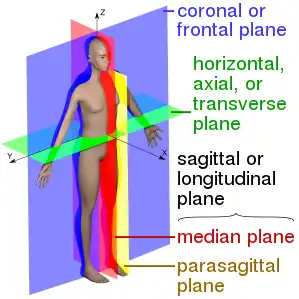Coronal plane
| Coronal plane | |
|---|---|
 The main anatomical planes of the human body, including sagittal or median (red), parasagittal (yellow), frontal or coronal plane (blue) and transverse or axial plane (green) | |
| Details | |
| Identifiers | |
| Latin | plana coronalia |
| TA98 | A01.2.00.001 |
| TA2 | 48 |
| FMA | 12246 |
| Anatomical terminology | |
A coronal plane (also known as the frontal plane) is any vertical plane that divides the body into ventral and dorsal (belly and back) sections.
It is one of the three main planes of the body used to describe the location of body parts in relation to each other axis.
Details
The coronal plane is an example of a longitudinal plane, because it is perpendicular to the transverse plane. For a human, the mid-coronal plane would transect a standing body into two halves (front and back, or anterior and posterior) in an imaginary line that cuts through both shoulders. The description of the coronal plane applies to most animals as well as humans even though humans walk upright and the various planes are usually shown in the vertical orientation.
The sternal plane (planum sternale) is a coronal plane which transects the front of the sternum.[1]
Etymology
The term is derived from Latin corona ('garland, crown'), from Ancient Greek κορώνη (korōnē, 'garland, wreath'). The coronal plane is so-called because it lies in the direction of Coronal suture.
Additional images
 Sectional Planes of the Brain
Sectional Planes of the Brain Identical twins at a gestational age of 15 weeks, shown in coronal and sagittal plane, respectively
Identical twins at a gestational age of 15 weeks, shown in coronal and sagittal plane, respectively Sagittal Section (top) Vs. coronal section (bottom) of a mouse brain
Sagittal Section (top) Vs. coronal section (bottom) of a mouse brain
See also
References
- ↑ "Definition: sternal plane from Online Medical Dictionary". Retrieved 2007-12-17.
External links
- "Anatomical Orientation - Page 2 of 9". University of Michigan Medical School. Archived from the original on 2007-11-23.